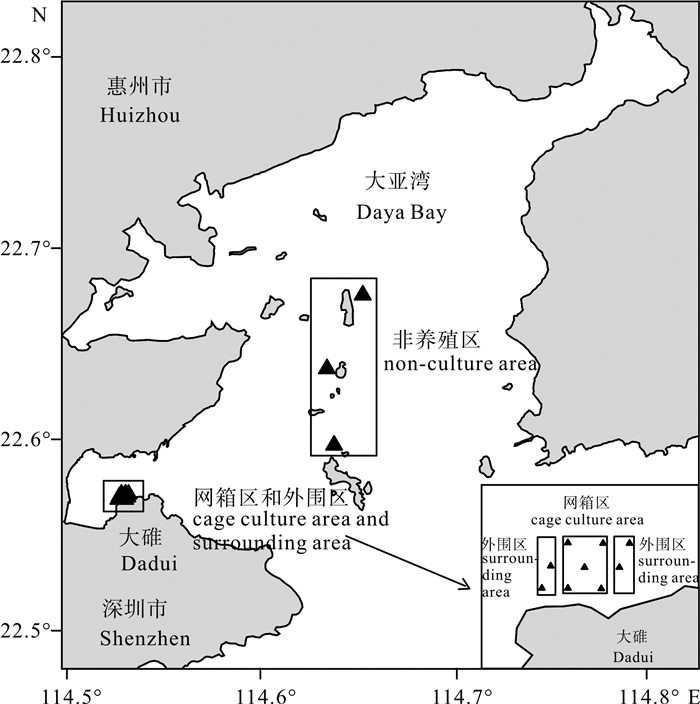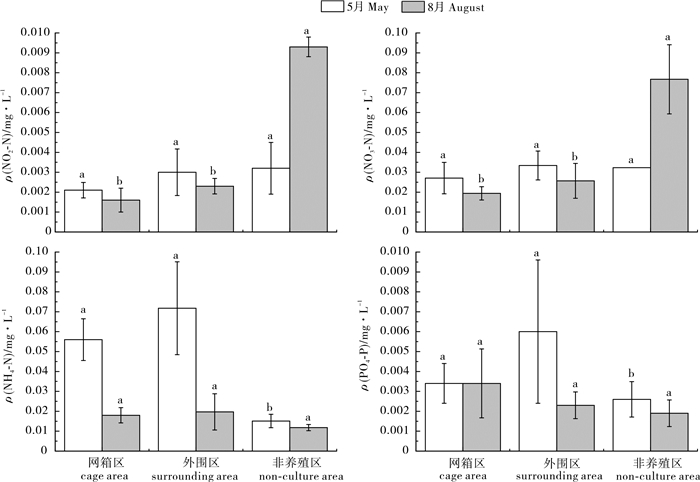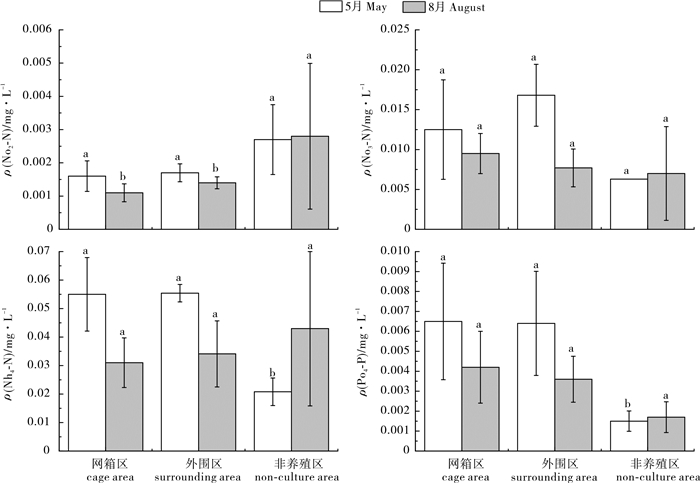Impact of deep-water net cage fish farming in Daya Bay, southern China on environment
-
摘要:
2016年5月(养殖开始前)和2016年8月(养殖投饵高峰期)对大亚湾大碓鱼类深水网箱区、外围区(网箱外0.1 km)和非养殖区(网箱外10~15 km)的海水和沉积环境进行了调查,采用有机污染指数(A)法、营养状态质量指数(NQI)法对水环境进行评价,用潜在生态危害指数(RI)法对表层沉积物重金属潜在生态危害进行评价。结果显示,与传统网箱养殖化学需氧量(COD)由网箱区中心向四周递减的趋势不同,深水网箱养殖CODMn浓度在3个区域间无显著性差异。深水网箱养殖海域水质较好(A < 1),水质处于贫营养水平(NQI < 2)。深水网箱养殖海域表层沉积物重金属铅(Pb)和锌(Zn)含量均符合第一类海洋沉积物质量标准,但铜(Cu)和镉(Cd)含量轻微超标。沉积环境处于轻微生态危害状态(Eri<30,RI<100),与中国同类型海区相比,污染危害程度相对并不严重。深水网箱养鱼对周围海域环境的影响较小。
Abstract:We investigated the seawater and sediments in a deep-water net cage area in Dadui, southwest Daya Bay, to assess the impact of farming activities on the ambient environment. The water and sediment samples were collected from cage culture area, surrounding area (located ca. 0.1 km from the nearest farming cage) and non-culture area (where no culture activities were practiced, located ca. 10~15 km from the nearest farming cage) in May (before the farming) and August 2016 (the most feeding activities and metabolism of cultured fish), respectively. The water environment was assessed using organic pollution index (A) and nutrient quality index (NQI), while the heavy metals potential ecological risk in surface sediment was assessed using potential ecological risk index (RI). The results show no significant difference of CODMn concentration among the three areas of deep-water net cage farming, while COD of the traditional cage farming showed a decreasing trend from the center to the surrounding of the cage area. The A value ( < 1) of cage culture area indicates that the water quality was in a general condition, and the relatively low NQI value ( < 2) indicates that the water quality was in a relatively poor nutrient condition. The contents of heavy metals in surface sediments of cage area were lower than the marine sediment quality standards ClassⅠexcept for those of Cu and Cd. The Eri value ( < 30) and RI value ( < 100) were relatively low, compared with many other culture areas in China, which indicates that the surface sedimentary environment of deep-water net cage area in Daya Bay is in slight ecological harm. It is suggested that the influence of deep-water net cage fish farming on the ambient water and sedimentary environment is relatively low or acceptable.
-
海水鱼类网箱养殖是一种高度集约化的养殖模式,依赖外源投饵维持高产出。传统网箱以木质结构的小型网箱为主,主要分布在近岸浅水海域,尤其是风浪较小的海湾,水动力条件相对较弱,养殖产生的残饵、粪便以及鱼类排泄物等向环境输入大量有机物和氮磷等营养物质,产生养殖自身污染,容易诱发富营养化和破坏底栖生态等问题[1-6]。深水网箱养殖近年来在中国发展迅速,深水网箱一般设置在水深8 m以深的海域,与传统网箱养殖相比,深水网箱具有抗风浪能力强、养殖容量大、经济效益高、养殖环境优良和病害少等优点[7],正在逐渐取代传统网箱。国外有关深水网箱养殖对生态环境影响的研究较多[8-12],而中国的相关研究相对较少[13-15]。
大亚湾是一个典型的亚热带半封闭型海湾,位于珠江口东侧,目前约有深水网箱300只,分布在大碓、惠东小星山和三门岛等海域。该研究对大亚湾大碓鱼类深水网箱区及邻近海域的水环境和表层沉积环境进行了监测,并采用有机污染指数(A)法和营养状态质量指数(NQI)法对水质状况进行评价,用潜在生态危害指数(RI)法对表层沉积环境重金属危害程度现状进行分析,旨在科学评价鱼类深水网箱养殖对海洋环境的影响,为鱼类深水网箱养殖产业更好发展提供科学依据。
1. 材料与方法
1.1 养殖海域概况
大碓鱼类深水网箱养殖区位于大亚湾西南侧的大鹏澳澳口处,水深8~10 m,有深水网箱80只,均为圆形双浮管升降式抗风浪网箱,网箱直径13 m,网衣深6 m,网箱容积约为796 m3。养殖卵形鲳鲹(Trachinotus ovatus),养殖周期从7月至当年11月,全程投喂配合饲料,每天投喂2~3次,投饵量约为鱼体质量的5%。每只网箱养殖(1~1.5)×104尾鱼,产量约为4 200 kg。每年收苗后至次年放苗前均未养殖,5月是养殖前其周围海域生态环境较有代表性的月份,8月水温较高,是养殖投饵高峰期和鱼类代谢最旺盛的时期。
1.2 监测方法
2016年5月和8月开展调查(图 1),在网箱区(5个站位)、外围区(网箱外0.1 km,4个站位)和非养殖区(即对照区,网箱外10~15 km,3个站位)共设置12个采样站位,用有机玻璃采水器分别采集表、底层海水,在养殖投饵高峰期用抓斗式采泥器采集表层沉积物。
样品采集和分析均按照《海洋监测规范》(GB 17378—2007)和《海洋调查规范》(GB/T 12763—2007)中规定的方法进行。水环境监测指标中水温、盐度、pH、溶解氧(DO)采用便携式水质分析仪(YSI Professional Plus 6600,美国)进行现场测定;悬浮颗粒物(TPM)用重量法;亚硝酸盐(NO2-N)用重氮-偶氮法;硝酸盐(NO3-N)用锌镉还原法;氨盐(NH4-N)用次溴酸钠氧化法;活性磷酸盐(PO4-P)用抗坏血酸还原磷钼蓝法;化学需氧量(CODMn)用碱性高锰酸钾氧化法;叶绿素a(Chl-a)用荧光分光光度法测定。表层沉积物重金属铜(Cu)、铅(Pb)、锌(Zn)、镉(Cd)含量测定用原子吸收分光光度法。
1.3 数据处理
1.3.1 水环境评价
海水的有机污染指数(A)[16-17]和营养状态质量指数(NQI)[18-19]依据以下公式计算:
$ A=\frac{{{C}_{\text{COD}}}}{C{{'}_{\text{COD}}}}+\frac{{{C}_{\text{DIN}}}}{C{{'}_{\text{DIN}}}}+\frac{{{C}_{\text{DIP}}}}{C{{'}_{\text{DIP}}}}-\frac{{{C}_{\text{DO}}}}{C{{'}_{\text{DO}}}} $
式中A为有机污染指数,分子为各项监测指标的实测值,分母为各项监测指标的评价标准值,即C′COD、C′DIN、C′DIP和C′DO分别为3 mg·L-1、0.10 mg·L-1、0.015 mg·L-1和5 mg·L-1。有机污染分级评价见表 1。
$ \text{NQI}=\frac{{{C}_{\text{COD}}}}{C{{'}_{\text{COD}}}}~+\frac{{{C}_{\text{DIN}}}}{C{{'}_{\text{DIN}}}}+\frac{{{C}_{\text{DIP}}}}{C{{'}_{\text{DIP}}}}+\frac{{{C}_{\text{Chl-a}}}}{C{{'}_{\text{Chl-a}}}} $
表 1 有机污染分级Table 1. Grade of organic pollution有机污染指数(A)organic pollution index < 0 0~1 1~2 2~3 3~4 > 4 污染分级assessment grade 0 1 2 3 4 5 水质评价assessment of water 良好 较好 开始污染 轻度污染 中度污染 严重污染 式中NQI为营养状态质量指数,分子为各项监测指标的实测值,分母为各项监测指标的评价标准值。即C′COD、C′DIN、C′DIP和C′Chl-a分别为3 mg·L-1、0.30 mg·L-1、0.03 mg·L-1和10 μg·L-1。营养状态分级:NQI < 2为贫营养水平;2~4为中营养水平;>4为富营养水平。
1.3.2 表层沉积环境重金属潜在生态危害评估
采用瑞典学者HAKANSON[20]提出的潜在生态危害指数(RI)法对表层沉积环境生态危害程度现状进行评估,公式如下:
$ C_{f}^{i}=\frac{{{C}^{i}}}{C_{n}^{i}} $
$ E_{r}^{i}=T_{r}^{i}\cdot C_{f}^{i} $
$ {\rm{RI}}=\sum\limits_{i=1}^{n}{E_{r}^{i}}=\sum\limits_{i=1}^{n}{T_{r}^{i}\cdot C_{f}^{i}}=\sum\limits_{i=1}^{n}{T_{r}^{i}\cdot \frac{{{C}^{i}}}{C_{n}^{i}}} $
式中Ci为表层沉积物第i种重金属含量的实测值,Cni为第i种重金属的背景值,文章采用张银英[21]调查的大亚湾工业化开发前沉积物中重金属元素含量为背景值,Cfi、Tri和Eri分别为r区域表层沉积物第i种重金属的污染系数、毒性系数和潜在生态危害系数,RI为潜在生态危害指数。各重金属的Cni值和Tri值见表 2。
表 2 重金属元素背景值和毒性系数Table 2. Background value of heavy metal elements and toxic coefficient元素element 铜Cu 铅Pb 锌Zn 镉Cd 背景值/mg·kg-1 background value 6.44 21.67 26.01 0.027 毒性系数toxic coefficient 5 5 1 30 沉积物重金属危害的等级划分采用谷阳光等[22]、甘居利等[23]的划分标准,轻微生态危害Eri<30,RI<100;中等生态危害30≤Eri<50,100≤RI<150;较强生态危害50≤Eri<100,150≤RI<200;很强生态危害100≤Eri<150,200≤RI<300;极强生态危害Eri≥150,RI≥300。
1.3.3 数据分析
数据处理利用SPSS 13.0进行单因素方差分析,显著性水平设置为0.05,存在显著差异时,采用Turkey方法进行多重比较,采用Pearson相关分析检验关系显著性,P < 0.05视为相关性显著,表、底层比较采用成对样本t检验,显著性水平设置为0.05。
2. 结果与讨论
2.1 水环境特征
调查海域的水环境特征见表 3,深水网箱养殖海域表层海水的DO质量浓度显著高于底层(P < 0.05)。表层水的DO质量浓度在3个区域间无显著性差异(P>0.05);而网箱区底层水的DO质量浓度则显著低于非养殖区(P < 0.05),但8月(养殖高峰期)的DO质量浓度均符合水产养殖区执行的第二类海水水质标准(>5 mg·L-1),5月(养殖前)部分站位的DO质量浓度略低,但仍符合第三类海水水质标准(>4 mg·L-1)。网箱区底层水DO质量浓度较低一方面是由于养殖鱼类呼吸,另一方面可能是由于养殖过程中所产生的残饵和粪便等颗粒有机物氧化分解,增加了溶解氧消耗[24-25]。
表 3 大亚湾深水网箱海域海水因子(平均值±标准差)Table 3. Seawater column characteristics in deep-water net cage area of Daya Bay (X ±SD)调查月份
sampling month区域
area水层
water depthρ(DIP)/mg·L-1 ρ(DIN)/mg·L-1 ρ(DO)/mg·L-1 ρ(TPM)/mg·L-1 ρ(CODMn)/mg·L-1 ρ(Chl-a)/μg·L-1 5月
May网箱区 表层
底层0.003±0.001a0.007±0.003a 0.085±0.016a0.067±0.019a 5.99±0.38a4.78±0.33b 10.06±1.11a8.10±3.30a 0.90±0.24a0.77±0.13a 4.76±1.34a2.81±0.59a 外围区 表层
底层0.006±0.004a0.006±0.003a 0.108±0.031a0.074±0.003a 5.25±0.91a4.72±0.25b 7.44±2.21a7.25±2.88a 1.06±0.19a0.74±0.17a 2.49±0.90a2.71±0.81a 非养殖区 表层
底层0.003±0.001a0.002±0.001b 0.029±0.020b0.026±0.005b 7.66±0.79a6.49±0.21a 7.60±0.60a10.33±3.43a 1.17±0.35a0.59±0.36a 4.70±2.81a4.38±4.00a 8月
August网箱区 表层
底层0.003±0.002a0.004±0.002a 0.039±0.006a0.042±0.011a 6.47±0.40a5.39±0.53b 4.77±1.01a6.62±0.97a 0.89±0.10a0.69±0.14a 2.59±0.71a3.77±1.06a 外围区 表层
底层0.002±0.001a0.004±0.001a 0.048±0.007a0.043±0.013a 6.47±0.50a5.63±0.59a 7.86±2.93a6.92±4.14a 0.77±0.21a0.58±0.18a 5.10±2.92a3.96±0.84a 非养殖区 表层
底层0.002±0.001a0.002±0.001a 0.073±0.033a0.099±0.042a 7.05±0.08a6.61±0.12a 5.44±1.07a5.11±2.36a 0.82±0.25a0.50±0.20a 2.49±0.47a2.78±0.84a 注:同一列中数据有相同上角标表示不存在显著差异(P > 0.05),后表同此
Note:Values with same superscript letters within the same column are not significantly different (P > 0.05). The same case in the following tables.深水网箱养殖海域表、底层海水的TPM质量浓度无显著性差异(P > 0.05),且TPM质量浓度在3个区域间亦无显著性差异(P > 0.05)。海水鱼类网箱养殖产生的有机污染物主要是残饵和粪便等颗粒物[26],且海水的TPM质量浓度与CODMn质量浓度显著正相关(P < 0.05)。调查海域海水CODMn质量浓度均符合第一类海水水质标准( < 2 mg·L-1),且表层浓度显著高于底层(P < 0.05),但3个区域的CODMn质量浓度差异没有达到显著水平(P > 0.05),与传统网箱养殖COD由网箱区中心向四周递减的趋势不一致[27]。这与网箱所在海域夏季逆时针低频流的驱动有关[28],有利于养殖产生的有机废物稀释和扩散,与调查海域的TPM质量浓度变化在3个区域间差异不显著相互印证。
调查期间表、底层海水的Chl-a质量浓度无显著性差异(P > 0.05),且3个区域的Chl-a质量浓度差异均未达到显著性水平(P > 0.05),8月(养殖高峰期)网箱区和外围区Chl-a质量浓度稍高于非养殖区,但仍远低于富营养化水平[ρ(Chl-a) > 10 μg·L-1,富营养化][29]。网箱区和外围区较高的Chl-a浓度可能是由于养殖的卵形鲳鲹排出的含氮废物,为浮游植物生长提供了所需的氮源。有研究发现卵形鲳鲹排泄的氮以氨态氮为主[30],而氨氮是浮游植物最容易吸收利用的形态[31]。夏季浮游植物快速生长会消耗较多的营养盐[32],这也与所观察到的网箱区氮营养盐浓度低于非养殖区的现象相一致(表 3),且浮游植物更为活跃的表层水中氨盐浓度比底层低(图 2和图 3)。
2.2 深水网箱养殖对海水环境的影响
调查海域海水环境指标和环境质量评价结果分别见表 3和表 4。3个区域的水质状况均较好,除5月网箱区和外围区的有机污染指数A值显著较高(P < 0.05),处于0~1(水质较好)外,其余A值均小于0(水质良好),这与对CODMn的调查结果一致。深水网箱养殖全部投喂浮性膨化配合饲料,卵形鲳鲹摄食时吞食饲料,饵料系数低[33],产生的有机碎屑较少。且深水网箱一般布置在水深较深的海域养殖,水动力作用相对较强,养殖产生的有机颗粒物较易被海流稀释和扩散。而大亚湾的传统网箱养殖主要是以鲜杂鱼作为饵料,饵料系数高[34],产生的残饵较多,因而形成有机污染。另外,传统网箱多分布在水深4~5 m的近岸区域养殖,水动力作用较弱,产生的颗粒物容易沉降在养殖区底部,污染较为严重,A值多在4以上[35-36]。与传统网箱相比,深水网箱的单位面积养殖鱼较多,但对水环境的影响较小。营养状态质量指数NQI在3个区域间无显著性差异(P>0.05),且均小于2,属贫营养水平,这与大亚湾贫营养的本底值相符合,优于传统网箱养殖海域[37-38]。整体上,养殖前(5月)网箱区、外围区的A和NQI均略高于非养殖区,而养殖投饵高峰期(8月)正相反,这与深水网箱养殖输出的残饵和粪便等污染物较少,养殖鱼类排泄的营养物质很快被消耗掉,营养盐水平均符合第一类海水水质标准[ρ(DIP) <0.015 mg·L-1;ρ(DIN) < 0.20 mg·L-1],且与养殖海域海流的稀释扩散有关。可见深水网箱养殖对该海域的水环境影响较小。
表 4 大亚湾深水网箱海域水环境评价(平均值±标准差)Table 4. Seawater assessment of deep-water net cage area of Daya Bay (X ±SD)调查月份
sampling month区域
area有机污染指数A 营养状态质量指数NQI 表层 底层 表层 底层 5月May 网箱区 0.18±0.20a 0.40±0.39a 1.17±0.18a 0.98±0.16a 外围区 0.78±0.66a 0.47±0.22a 1.16±0.08a 0.98±0.19a 非养殖区 -0.72±0.15b -0.74±0.10b 1.17±0.41a 0.83±0.45a 8月August 网箱区 -0.44±0.18a -0.24±0.24a 0.74±0.14a 0.79±0.18a 外围区 -0.47±0.20a -0.31±0.24a 0.94±0.33a 0.81±0.17a 非养殖区 -0.28±0.37a -0.64±0.38a 0.83±0.20a 0.74±0.30a 2.3 表层沉积环境重金属潜在生态危害评价
调查海域养殖投饵高峰期(8月)表层沉积物重金属质量分数和生态危害分别见表 5和表 6。除网箱区和外围区的Cu以及外围区的Cd质量分数显著较高(P < 0.05),轻微超过第一类海洋沉积物质量标准以外,其余均符合标准。网箱区和外围区的Cu含量稍高与该区域的本底值较高有关[39],且近年来有上升趋势[40]。此外,大亚湾海域沉积物中Cu的富集系数较高[39],养殖饲料的Cu输入在表层沉积物中累积[41]也是调查海域Cu含量超标的可能原因。表层沉积物Cu、Pb、Zn和Cd重金属潜在生态危害系数(Eri)分别为23.04、7.59、2.37和36.11,平均重金属综合潜在生态风险指数(RI)仅为70.32,处于轻微生态危害状态(Eri<30,RI<100),与潮州柘林湾养殖区[42]、厦门贝类养殖区[43]和浙北地区养殖池塘[44]接近,优于珠海桂山岛网箱养鱼区[42]和宁波象山港养殖区[45]。可见,当前大亚湾深水网箱养殖海域表层沉积环境的潜在生态危害较小。
表 5 大亚湾深水网箱海域重金属质量分数(平均值±标准差)Table 5. Heavy metals contents in deep-water net cage area of Daya Bay ( X ±SD)mg·kg-1 区域
area元素element 铜Cu 铅Pb 锌Zn 镉Cd 网箱区cage area 43.45±6.01a 41.70±20.92a 69.23±25.93a 0.02±0.00b 外围区surrounding area 39.20±6.51a 30.45±1.63a 79.20±2.40a 0.06±0.01a 非养殖区non-culture area 14.13±0.85b 25.67±7.04a 42.53±33.02a 0.03±0.02b 表 6 大亚湾深水网箱海域表层沉积环境重金属危害状况(平均值±标准差)Table 6. Damage of heavy metals in surface sediments from deep-water net cage area of Daya Bay ( X ±SD)区域
area潜在生态危害系数Eri 潜在生态危害指数RI 铜Cu 铅Pb 锌Zn 镉Cd 网箱区cage area 33.73±4.67a 9.62±4.82a 2.66±1.00a 22.22±0.00b 61.32±11.36a 外围区surrounding area 30.44±5.06a 7.03±0.37a 3.05±0.09a 61.12±7.86a 101.62±2.34a 非养殖区non-culture area 10.97±0.66b 5.92±0.63a 1.64±1.27a 33.33±19.25b 51.85±18.27b 3. 结论
1) 深水网箱养殖海域的TPM和CODMn质量浓度在表、底层海水和3个区域间均无显著性差异;DO和CODMn质量浓度虽然在3个区域间无显著性差异,但表层质量浓度均显著高于底层。网箱区底层水DO质量浓度较低,这可能是由于养殖鱼类呼吸,也可能是由于养殖过程中所产生的残饵和粪便等颗粒有机物氧化分解,增加了DO消耗。深水网箱养殖与传统网箱养殖COD由网箱区中心向四周递减的趋势不一致,这与网箱所在海域余流对有机废物的稀释和扩散有关。
2) 深水网箱养殖海域的水质状况较好,有机污染指数A值均小于1;营养状态质量指数NQI均不超过2,属贫营养水平。养殖前(5月)网箱区、外围区的A和NQI略高于非养殖区,而养殖投饵高峰期(8月)正相反,这与深水网箱养殖输出的残饵和粪便等污染物较少,养殖鱼类排泄的营养物质也很快被消耗掉,营养盐质量浓度均符合第一类海水水质标准[ρ(DIP) < 0.015 mg·L-1;ρ(DIN) < 0.20 mg·L-1],且与养殖区海流的稀释扩散有关。可见,深水网箱养殖对该海域的水环境影响较小。
3) 深水网箱养殖海域表层沉积物重金属Pb和Zn含量均符合第一类海洋沉积物质量标准,Cu和Cd含量轻微超标。平均重金属综合RI为70.32,处于轻微生态危害状态(Eri<30,RI<100),与中国同类型海湾相比,当前大亚湾深水网箱养殖海域表层沉积环境的潜在生态危害较小。
综上,大亚湾鱼类深水网箱养殖对周围海域环境的影响较小,是一种可持续发展的健康养殖模式。
-
表 1 有机污染分级
Table 1 Grade of organic pollution
有机污染指数(A)organic pollution index < 0 0~1 1~2 2~3 3~4 > 4 污染分级assessment grade 0 1 2 3 4 5 水质评价assessment of water 良好 较好 开始污染 轻度污染 中度污染 严重污染 表 2 重金属元素背景值和毒性系数
Table 2 Background value of heavy metal elements and toxic coefficient
元素element 铜Cu 铅Pb 锌Zn 镉Cd 背景值/mg·kg-1 background value 6.44 21.67 26.01 0.027 毒性系数toxic coefficient 5 5 1 30 表 3 大亚湾深水网箱海域海水因子(平均值±标准差)
Table 3 Seawater column characteristics in deep-water net cage area of Daya Bay (X ±SD)
调查月份
sampling month区域
area水层
water depthρ(DIP)/mg·L-1 ρ(DIN)/mg·L-1 ρ(DO)/mg·L-1 ρ(TPM)/mg·L-1 ρ(CODMn)/mg·L-1 ρ(Chl-a)/μg·L-1 5月
May网箱区 表层
底层0.003±0.001a0.007±0.003a 0.085±0.016a0.067±0.019a 5.99±0.38a4.78±0.33b 10.06±1.11a8.10±3.30a 0.90±0.24a0.77±0.13a 4.76±1.34a2.81±0.59a 外围区 表层
底层0.006±0.004a0.006±0.003a 0.108±0.031a0.074±0.003a 5.25±0.91a4.72±0.25b 7.44±2.21a7.25±2.88a 1.06±0.19a0.74±0.17a 2.49±0.90a2.71±0.81a 非养殖区 表层
底层0.003±0.001a0.002±0.001b 0.029±0.020b0.026±0.005b 7.66±0.79a6.49±0.21a 7.60±0.60a10.33±3.43a 1.17±0.35a0.59±0.36a 4.70±2.81a4.38±4.00a 8月
August网箱区 表层
底层0.003±0.002a0.004±0.002a 0.039±0.006a0.042±0.011a 6.47±0.40a5.39±0.53b 4.77±1.01a6.62±0.97a 0.89±0.10a0.69±0.14a 2.59±0.71a3.77±1.06a 外围区 表层
底层0.002±0.001a0.004±0.001a 0.048±0.007a0.043±0.013a 6.47±0.50a5.63±0.59a 7.86±2.93a6.92±4.14a 0.77±0.21a0.58±0.18a 5.10±2.92a3.96±0.84a 非养殖区 表层
底层0.002±0.001a0.002±0.001a 0.073±0.033a0.099±0.042a 7.05±0.08a6.61±0.12a 5.44±1.07a5.11±2.36a 0.82±0.25a0.50±0.20a 2.49±0.47a2.78±0.84a 注:同一列中数据有相同上角标表示不存在显著差异(P > 0.05),后表同此
Note:Values with same superscript letters within the same column are not significantly different (P > 0.05). The same case in the following tables.表 4 大亚湾深水网箱海域水环境评价(平均值±标准差)
Table 4 Seawater assessment of deep-water net cage area of Daya Bay (X ±SD)
调查月份
sampling month区域
area有机污染指数A 营养状态质量指数NQI 表层 底层 表层 底层 5月May 网箱区 0.18±0.20a 0.40±0.39a 1.17±0.18a 0.98±0.16a 外围区 0.78±0.66a 0.47±0.22a 1.16±0.08a 0.98±0.19a 非养殖区 -0.72±0.15b -0.74±0.10b 1.17±0.41a 0.83±0.45a 8月August 网箱区 -0.44±0.18a -0.24±0.24a 0.74±0.14a 0.79±0.18a 外围区 -0.47±0.20a -0.31±0.24a 0.94±0.33a 0.81±0.17a 非养殖区 -0.28±0.37a -0.64±0.38a 0.83±0.20a 0.74±0.30a 表 5 大亚湾深水网箱海域重金属质量分数(平均值±标准差)
Table 5 Heavy metals contents in deep-water net cage area of Daya Bay ( X ±SD)
mg·kg-1 区域
area元素element 铜Cu 铅Pb 锌Zn 镉Cd 网箱区cage area 43.45±6.01a 41.70±20.92a 69.23±25.93a 0.02±0.00b 外围区surrounding area 39.20±6.51a 30.45±1.63a 79.20±2.40a 0.06±0.01a 非养殖区non-culture area 14.13±0.85b 25.67±7.04a 42.53±33.02a 0.03±0.02b 表 6 大亚湾深水网箱海域表层沉积环境重金属危害状况(平均值±标准差)
Table 6 Damage of heavy metals in surface sediments from deep-water net cage area of Daya Bay ( X ±SD)
区域
area潜在生态危害系数Eri 潜在生态危害指数RI 铜Cu 铅Pb 锌Zn 镉Cd 网箱区cage area 33.73±4.67a 9.62±4.82a 2.66±1.00a 22.22±0.00b 61.32±11.36a 外围区surrounding area 30.44±5.06a 7.03±0.37a 3.05±0.09a 61.12±7.86a 101.62±2.34a 非养殖区non-culture area 10.97±0.66b 5.92±0.63a 1.64±1.27a 33.33±19.25b 51.85±18.27b -
[1] HUNG J J, HUANG W C, YU C S.Environmental and biogeochemical changes following a decade′s reclamation in the Dapeng (Tapong) Bay, southwestern Taiwan[J].Est Coast Shelf Sci, 2013, 130(SI):9-20. https://www.sciencedirect.com/science/article/pii/S0272771413001443
[2] 韦献革, 温琰茂, 王文强, 等.哑铃湾网箱养殖区底层水营养盐的分布与评价[J].中山大学学报(自然科学版), 2005, 44(4):115-119. http://www.cqvip.com/qk/94631X/200504/18060953.html [3] 李成高, 崔毅, 陈碧鹃, 等.唐岛湾网箱养殖区底层水营养盐变化及营养状况分析[J].海洋水产研究, 2006, 27(5):56-61. http://www.oalib.com/paper/4995229 [4] 黄洪辉, 林钦, 王文质, 等.大鹏澳海水鱼类网箱养殖对水环境的影响[J].南方水产, 2005, 1(3):9-17. http://www.oalib.com/paper/4678454 [5] 黄洪辉, 林钦, 林燕棠, 等.大亚湾网箱养殖海域大型底栖动物的时空变化[J].中国环境科学, 2005, 25(4):412-416. http://www.irgrid.ac.cn/handle/1471x/215494 [6] 李娟, 葛长字, 毛玉泽, 等.沉积环境对鱼类网箱养殖的响应[J].海洋渔业, 2010, 32(4):461-465. http://industry.wanfangdata.com.cn/dl/Detail/Periodical?id=... [7] 黎文辉, 巫特坚.大亚湾海域深水抗风浪网箱养殖现状及产业发展模式初探[J].中国水产, 2012(11):76-78. doi: 10.3969/j.issn.1002-6681.2012.11.035 [8] GARCÉA B G, JIMÉNE C R, AGUADO-GIMÉNEZ F, et al. Life cycle assessment of gilthead seabream (Sparus aurata) production in offshore fish farms[J].Sustainability, 2016, 8(12):1228. doi: 10.3390/su8121228
[9] ARECHAVALA-LOPEZ P, BORG J A, ŠEGVIĆ-BUBIĆ T, et al. Aggregations of wild Atlantic bluefin tuna (Thunnus thynnus L.) at Mediterranean offshore fish farm sites:environmental and management considerations[J].Fish Res, 2015, 164:178-184. doi: 10.1016/j.fishres.2014.11.011
[10] WANG X X, ANDERSON K, HANDÅ A, et al. Chemical composition and release rate of waste discharge from an Atlantic salmon farm with an evaluation of IMTA feasibility[J].Aquacult Environ Interac, 2013, 4(2):147-162. doi: 10.3354/aei00079
[11] WANG X X, OLSEN L M, REITAN K I, et al.Discharge of nutrient wastes from salmon farms:environmental effects, and potential for integrated multi-trophic aquaculture[J].Aquacult Environ Interac, 2012, 2(3):267-283. doi: 10.3354/aei00044
[12] KORZEN L, ABELSON A, ISRAEL A.Growth, protein and carbohydrate contents in Ulva rigida and Gracilaria bursa-pastoris integrated with an offshore fish farm[J].J Appl Phycol, 2016, 28(3):1835-1845. doi: 10.1007/s10811-015-0691-5
[13] 金卫红, 周小敏.深水网箱养殖海域水质状况评价[J].浙江海洋学院学报(自然科学版), 2006, 25(1):46-49. http://www.cqvip.com/qk/97875A/200602/22266987.html [14] 葛长字, 方建光.夏季海水养殖区大型网箱内外沉降颗粒物通量[J].中国环境科学, 2006, 26(z1):106-109. doi: 10.3321/j.issn:1000-6923.2006.z1.026 [15] 张汉华, 梁超愉, 吴进锋, 等.大鹏湾深水网箱养殖区的污损生物研究[J].中国水产科学, 2003, 10(5):414-418. http://edu.wanfangdata.com.cn/Periodical/Detail/hyhjkx201006019 [16] 国家技术监督局. GB17378. 7—2007. 海洋监测规范第7部分: 近海污染生态调查和生物监测[S]. 北京: 标准出版社, 2007: 46. [17] 张继红, 任黎华, 徐东, 等.桑沟湾筏式养鲍区水质分析[J].水产学报, 2011, 35(6):897-904. http://www.oalib.com/paper/4673787 [18] 国家技术监督局. GB12763. 9—2007. 海洋调查规范第9部分: 海洋生态调查指南[S]. 北京: 标准出版社, 2007: 16. [19] 杜虹, 郑兵, 陈伟洲, 等.深澳湾海水养殖区水化因子的动态变化与水质量评价[J].海洋与湖沼, 2010, 41(6):816-823. doi: 10.11693/hyhz201006003003 [20] HAKANSON L.An ecological risk index for aquatic pollution control. A sedimentological approach[J].Water Res, 1980, 14(8):975-1001. doi: 10.1007/s10661-012-2785-8
[21] 张银英.大亚湾沉积物中重金属元素背景值研究[J].热带海洋, 1991, 10(3):76-80. http://www.cqvip.com/QK/96022X/199103/580074.html [22] 谷阳光, 林钦, 王增焕, 等.柘林湾及邻近海域沉积物重金属分布与潜在生态风险[J].南方水产科学, 2013, 9(2):32-37. http://www.schinafish.cn/CN/abstract/abstract9019.shtml [23] 甘居利, 贾晓平, 林钦, 等.近岸海域底质重金属生态风险评价初步研究[J].水产学报, 2000, 24(6):533-538. http://www.oalib.com/paper/5091605 [24] 杨美兰, 林钦, 黄洪挥, 等.大鹏澳养殖水域溶解氧的变化及其与生态结构的关系[J].中国水产科学, 2005, 12(3):357-361. http://www.oalib.com/paper/4995229 [25] 蔡清海, 杜琦, 钱小明, 等.福建罗源湾网箱养殖区海洋生态环境质量评价[J].海洋科学进展, 2007, 25(1):101-110. http://cpfd.cnki.com.cn/Article/CPFDTOTAL-FJHY201409001040.htm [26] 蒋增杰, 方建光, 毛玉泽, 等.海水鱼类网箱养殖水域沉积物有机质的来源甄别[J].中国水产科学, 2012, 19(2):348-354. http://www.cnki.com.cn/Article/CJFDTotal-SEAE201412006.htm [27] 韩芳, 霍元子, 杜霞, 等.象山港网箱养殖对水域环境的影响[J].上海海洋大学学报, 2012, 21(5):825-830. http://www.oalib.com/paper/5105600 [28] 吴日升, 李立.大亚湾大鹏澳夏季余流的分析[J].台湾海峡, 1993, 12(1):48-54. http://www.cnki.com.cn/Article/CJFDTOTAL-TWHX199301008.htm [29] 张瑜斌, 章洁香, 张才学, 等.赤潮多发区深圳湾叶绿素a的时空分布及其影响因素[J].生态环境学报, 2009, 18(5):1638-1643. http://www.oalib.com/paper/4847773 [30] 孙丽华, 陈浩如, 黄洪辉, 等.摄食水平对几种重要海水养殖鱼类生长和氮收支的影响[J].水产学报, 2009, 33(3):470-478. http://www.cqvip.com/QK/90183X/200903/30394301.html [31] 焦念志.海洋浮游生物氮吸收动力学及其粒级特征[J].海洋与湖沼, 1995, 26(2):191-198. http://www.cnki.com.cn/Article/CJFDTOTAL-SSDB200905010.htm [32] 丘耀文, 王肇鼎, 朱良生.大亚湾海域营养盐与叶绿素含量的变化趋势及其对生态环境的影响[J].台湾海峡, 2005, 24(2):131-139. http://www.irgrid.ac.cn/handle/1471x/215509 [33] 古恒光, 周银环.传统网箱和深水网箱养殖卵形鲳鲹的对比试验[J].水产养殖, 2009, 30(2):5-7. http://d.wanfangdata.com.cn/Thesis/Y1174535 [34] 舒廷飞, 温琰茂, 陆雍森, 等.网箱养殖N、P物质平衡研究-以广东省哑铃湾网箱养殖研究为例[J].环境科学学报, 2004, 24(6):1046-1052. http://www.oalib.com/paper/4345618 [35] 周艳荣, 马文斋, 高振会.唐岛湾海域营养状态及有机污染状况分析[J].海洋环境科学, 2008, 27(z2):70-73. doi: 10.3969/j.issn.1007-6336.2008.z2.015 [36] 韩芳. 象山港网箱养殖富营养化状况及鱼藻生态修复模式研究[D]. 上海: 上海海洋大学, 2012: 15. [37] 蒋增杰, 方建光, 毛玉泽, 等.宁波南沙港网箱养殖水域营养状况评价及生物修复策略[J].环境科学与管理, 2010, 35(11):162-167. doi: 10.3969/j.issn.1673-1212.2010.11.041 [38] 彭璇, 马胜伟, 陈海刚, 等.粤柘林东湾—南澳岛海洋牧场的海水营养状况及其等级评价[J].广东农业科学, 2014, 41(19):135-141. doi: 10.3969/j.issn.1004-874X.2014.19.031 [39] 丘耀文, 颜文, 王肇鼎, 等.大亚湾海水、沉积物和生物体中重金属分布及其生态危害[J].热带海洋学报, 2005, 24(5):69-76. https://www.wenkuxiazai.com/doc/c954a4c2d1f34693dbef3e27... [40] 苗莉, 颜文, 钟立峰, 等.大亚湾马尾藻细胞中Cu、Pb、As的生物地球化学特征与环境意义[J].地球科学:中国地质大学学报, 2012, 37(1):139-144. http://www.cnki.com.cn/Article/CJFDTotal-YYZL201501001.htm [41] 柯常亮, 林钦, 王增焕, 等.大鹏澳网箱养殖区沉积物中Cu的分布特征[J].南方水产, 2007, 3(1):20-25. http://www.oalib.com/paper/4365665 [42] 冯杰. 广东省典型养殖海域沉积物生源要素及重金属分布特征与生态危害评价[D]. 广州: 暨南大学, 2011: 87-88. [43] 阮金山, 钟硕良, 杨妙峰, 等.厦门贝类养殖区重金属的含量分布特征与潜在生态危害评价[J].海洋环境科学, 2009, 28(1):57-61. http://www.cnki.com.cn/Article/CJFDTOTAL-HYHJ200901014.htm [44] 赵汉取, 韦肖杭, 王俊, 等.浙北地区养殖池塘表层沉积物重金属潜在生态风险评价[J].安全与环境学报, 2014, 14(2):225-229. http://www.cqvip.com/QK/93836X/201506/666635375.html [45] 丰卫华, 陈立红, 宋伟华, 等.象山港及其邻近海域表层沉积物中重金属的水平分布特征及其污染评价[J].中国海洋大学学报(自然科学版), 2016, 46(4):71-78. http://www.cqvip.com/QK/91181X/200809/28140297.html -
期刊类型引用(21)
1. 黄宏,刘怡琳,俞锦辰,兰艳,赵旭,王钻一,李迎东,储鸣. 马袅湾网箱养殖对沉积物营养盐的影响. 海洋湖沼通报. 2024(03): 129-140 .  百度学术
百度学术
2. 姚德强,孙伟杰,孙博怿,徐卫国,沈天富,吕烨锋,王珏,施沁璇. 桐乡市渔业水环境时空变化及其影响因素. 浙江农业科学. 2024(07): 1720-1726 .  百度学术
百度学术
3. 薛尊,石建高,张文阳. 中国重力式深水网箱研究进展和展望. 渔业研究. 2024(04): 393-402 .  百度学术
百度学术
4. 陈军,胡高宇,陈飞,蔡逸龙,陈然,沈海钰,李敏. 温岭隘顽湾海水养殖区池塘水质状况调查与评价. 浙江海洋大学学报(自然科学版). 2024(03): 260-267 .  百度学术
百度学术
5. 庞巧珠,陈丹丹,陈晓慧,谢海群,梁计林. 后水湾深水网箱养殖区水环境的时空变化和营养状态分析. 广西科学. 2024(04): 742-753 .  百度学术
百度学术
6. 刘雁,佟飞,陈丕茂,袁华荣,冯雪. 海水养殖尾水总磷测定方法的比较与优化. 南方水产科学. 2023(01): 58-66 .  本站查看
本站查看
7. 葛伟宏,王兴强,苏家齐,朱长波. 大亚湾深水网箱养殖海域表层沉积物碳、氮、磷分布特征及污染评估. 江苏海洋大学学报(自然科学版). 2023(04): 51-59 .  百度学术
百度学术
8. 王枫林,高云涛,高云红,李明月,张秉智,关长涛,贾玉东. 斑石鲷陆海接力养殖初步研究. 渔业现代化. 2022(04): 8-14 .  百度学术
百度学术
9. 苏家齐,朱长波,张博,陈素文,李婷. 海陵湾网箱养殖区浮游植物群落结构及其与环境因子的关系. 上海海洋大学学报. 2022(04): 929-939 .  百度学术
百度学术
10. 陈丹丹,庞巧珠,涂志刚,谢海群,陈晓慧. 后水湾深水网箱养殖区浮游植物群落季节变化及其与环境因子的关系. 海洋环境科学. 2021(01): 73-80 .  百度学术
百度学术
11. 阮素玲,李敏,陆荣茂,肖国强,张翔,陆振. 南麂海域水质营养盐和表层沉积物重金属污染评价. 安徽农业科学. 2021(12): 60-63 .  百度学术
百度学术
12. 段丁毓,秦传新,朱文涛,马鸿梅. 海洋牧场景观生态分类研究:以柘林湾海洋牧场为例. 渔业科学进展. 2020(02): 1-11 .  百度学术
百度学术
13. 杨文超,黄道建,陈继鑫,陈晓燕,王宇珊,孙丽梅. 大亚湾2010—2018年表层沉积物中重金属含量时空分布及生态风险评价. 南方水产科学. 2020(04): 39-46 .  本站查看
本站查看
14. 杨文超,黄道建,陈继鑫,陈晓燕,王宇珊,孙丽梅. 大亚湾海域2009—2018年重金属时空分布及污染评价. 华南师范大学学报(自然科学版). 2020(05): 65-75 .  百度学术
百度学术
15. 陈丹丹,庞巧珠,陈晓慧,孙婆援,涂志刚. 2018年春秋季海南后水湾浮游植物群落结构特征及其与环境因子的关系. 海洋湖沼通报. 2020(05): 113-120 .  百度学术
百度学术
16. 杨文超,黄道建,陈继鑫,陈晓燕,王宇珊. 大亚湾近十年沉积物中汞、砷分布及污染评价. 水产科学. 2020(06): 915-921 .  百度学术
百度学术
17. 石一茜,赵旭,林军,李大鹏,黄宏,章守宇. 基于总量和形态的表层沉积物重金属污染及来源——以马鞍列岛海域为例. 中国环境科学. 2019(03): 1189-1198 .  百度学术
百度学术
18. 席小慧,尤广然,吴英超,刘明,赵东洋. 庄河市海洋牧场发展需求及布局策略研究. 渔业研究. 2019(03): 252-257 .  百度学术
百度学术
19. 陈得仿,王腾,刘永,肖雅元,王九江,李纯厚. 大亚湾黑鲷繁殖特征的生物学研究. 南方水产科学. 2019(05): 41-47 .  本站查看
本站查看
20. 王毛兰,刘景景. 鄱阳湖网箱养殖对水环境的影响——以都昌水域为例. 环境化学. 2019(10): 2348-2355 .  百度学术
百度学术
21. 雷建军,王大鹏,肖俊军,何安尤,李育森. 广西岩滩水库不同养殖类型区域沉积物磷分布特征分析. 南方农业学报. 2017(12): 2288-2294 .  百度学术
百度学术
其他类型引用(14)




 下载:
下载:


 粤公网安备 44010502001741号
粤公网安备 44010502001741号
